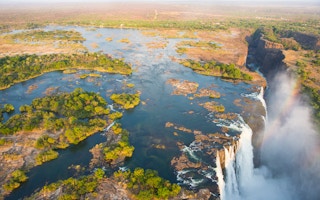Nature is declining at a staggering rate, driving instability for the markets and financial systems, and undermining development and economic growth. Despite the vast impact of these risks, they are rarely measured and are largely excluded from corporate decision-making, risk assessments and regulation.
A new market-led Taskforce on Nature-related Financial Disclosures (TNFD) framework launched on Friday, aims to help organisations to report and translate evolving nature-related risks into financial terms, to support a shift in global financial flows away from destructive activities.
Elizabeth Maruma Mrema, executive secretary of the United Nations Convention on Biological Diversity will co-chair the TNFD with David Craig, founder of financial-data company Refinitiv, who is due to become a senior advisor next month at the London Stock Exchange.
The World Wide Fund for Nature’s (WWF) Living Planet Report 2020 found that populations of wild species have declined on average by 68 per cent since 1970. One million animal and plant species are now threatened with extinction, according to a 2019 study from Intergovernmental Science-Policy Platform on Biodiversity and Ecosystem Services (IPBES), more than ever before in human history.
“The health of the ecosystems on which we, and our economies, depend is deteriorating more rapidly than ever,” Mrema said in a statement.
Three socio-economic systems including: infrastructure and the built environment; food, land and ocean use; and extractives and energy represent a third of the global economy and provide up to two-thirds of all jobs. However, they all represent the largest threat to the total threatened and near-threatened species, according to a report by the the World Economic Forum (WEF).
“Without urgent action, ongoing loss to biodiversity poses unprecedented risks for business, both now and in the future,” said Craig.
Action for a nature-positive transition, however, has the potential to generate up to US$10.1 trillion in annual business value, creating 395 million jobs by 2030, the WEF report states.
The disclosure initiative, backed by heavyweight financial institutions like AXA, BNP Paribas, DBS Bank, Rabobank, First Rand, Yes Bank, Storebrand as well as the governments of United Kingdom, France, the Netherlands and Switzerland, will support business in assessing emerging nature-related risks and opportunities.
“Better nature-related data that enables informed decision-making by financial institutions and companies is how we will solve the global ecological crisis,” Craig said. “Financial disclosures are essential to a market-based solution to nature loss. A properly functioning, informed market will price in risks appropriately and be empowered to channel investments to more sustainable opportunities.”
A task force of about 30 members, representing financial institutions, corporates and data and service providers from developed and emerging economies, will guide the project under Mrema and Craig’s lead.
In its first year, the TNFD aims to “build upon the success” of the Task Force on Climate-related Financial Disclosures (TCFD), which encourages companies to publicly disclose their environmental risks and for investors to declare emissions in their portfolios.
“Helping companies, investors, and financial institutions to measure and address financial risks derived from biodiversity loss will help redirect financial flows into nature-positive investments. We need this kind of transparency to underwrite the changes the planet needs, both in the short and long-term,” Global Environment Facility chief executive and chairperson, Carlos Manuel Rodriguez said in a statement.
The task force is likely to find a lack of data and measurement tools valuing biodiversity a challenge. “Unlike carbon, the nature side has not had the same level of focus on how you measure it, and it kind of dropped off the agenda,” Kavita Prakash-Mani, chief executive of the Mandai Nature Fund, recently told Eco-Business.
A renewed focus on disclosing financial risks could push the issue further up the agenda during the United Nations Convention on Biological Diversity scheduled to take place in Kunming, China in October.
The TNFD initiative was first announced in July 2020 by a coalition of partners including Global Canopy, United Nations Development Programme (UNDP), United Nations Economic Programmes (UNEP), Finance Initiative and WWF. The framework will be tested and refined in 2022 before its launch and dissemination in 2023.

















